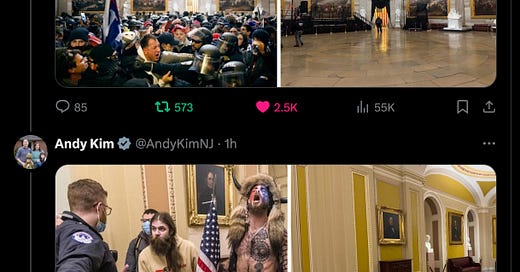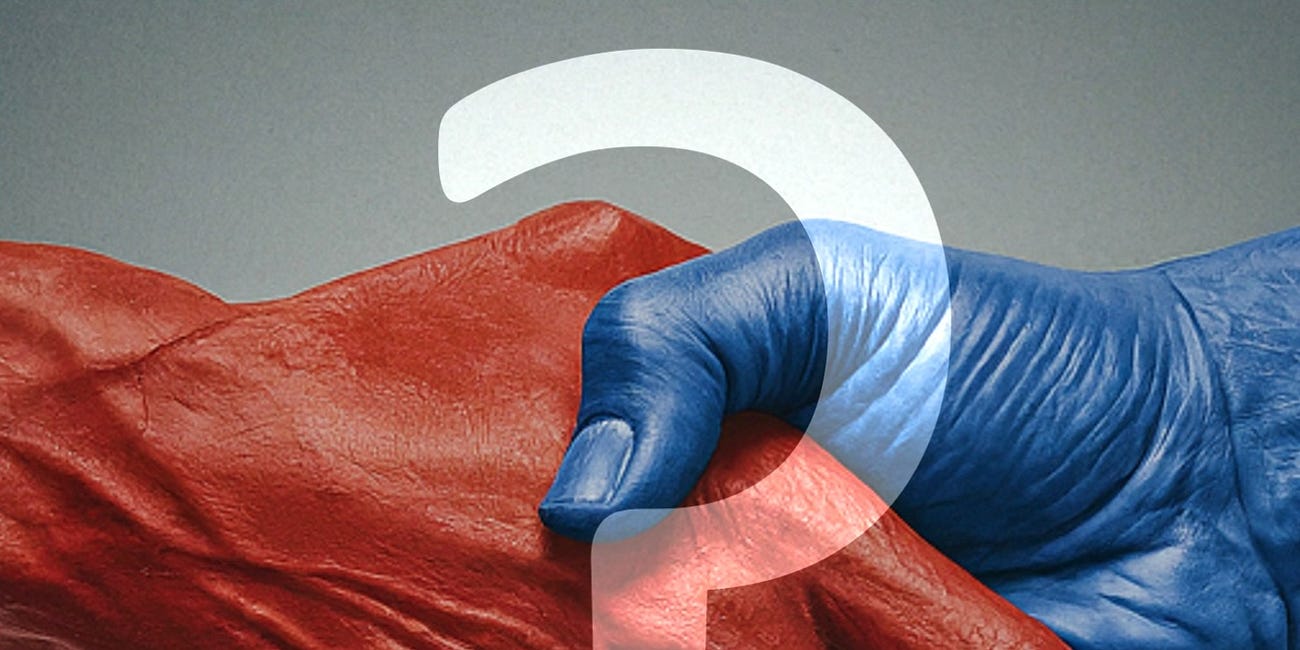Yes, I’ll get back to climate and sustainability policy soon, but without functioning democracies (in the United States and elsewhere) don’t count on seeing much progress. So here’s more on the presidency in the age of Trump…
January 6, 2021, will always be a day that lives in infamy. This snippet from video released by the House committee that examined the insurrection shows how Trump’s social media signals inspired some of the worst that day (full video).
Supposedly clicking the ♡ button helps boost visibility of Substack posts. So please do so if you like what I’m tryiing to do.
As you reflect on President-elect Trump’s victory being certified, also be sure to read the front-line recollections and thoughts of U.S. Capitol Police veteran
in a wrenching but vital essay on the 1/6/2021 assault on democracy for . Here’s an excerpt:I’ve been a faithful public servant in the Army and as a law enforcement officer for twenty-five years.
I did what I did on January 6th because it was my job. I kept my oath. And since that day, I’ve felt an obligation to tell the American people exactly what we experienced and went through. They deserved to know the truth. My expectation was that our elected officials felt the same way—that they would not condone but condemn what happened, denounce the violence, and hold accountable the people responsible for it.
I did my part. They did not do theirs.
Instead, they gave the former president a platform to run again. The Republican officials who were the target of the mob contorted themselves to justify Trump’s actions. Others remained silent when they could have spoken out. Mitch McConnell refused to use his power to hold Trump accountable during Trump’s second impeachment. Kevin McCarthy flew to Mar-a-Lago to kiss the ring. They chose politics over what was best for the country. Donald Trump would not be president-elect today if not for those two individuals. They helped him turn January 6th into a badge of honor. While privately excoriating and expressing concern about Trump’s transgressions, publicly they have been staunch supporters. [READ THE REST]
What should be celebrated
To my eye, January 7, 2021, is the day to remember because, despite the best efforts of then-outgoing President Trump and his sycophants, the sytem held. If there ever is a national holiday marking the moment four years ago, this would be a better choice than the day of the assault on the Constitution itself.
The first signs of the importance of the day after, and months and years since, came well before dawn on the 7th, encapsulated in images captured by AP photographer Andrew Harnik showing then-Representative (now Senataor) Andy Kim of New Jersey cleaning filth left on the Capitol floors.

Today, just ahead of certification of Trump’s election victory, now-Senator Andy Kim posted a haunting series of before / after images on X. Please explore the full series.
What can you or I and anyone else do to avert or mitigate the worst of what Trump has pledged to do? How can we make sure the system continues to hold?
One way is to choose carefully how you discuss evens like January 6th with wider communities - that’s the “framing” world of Berkeley linguist / philospher George Lakoff and
, with whom he co-writes the blog. They’ve posted a tactical guide in both blog and video form. Here’s the video on “Ten ways to keep democracy alive”:And here’s their post listing 17 different ways to stave off authoritarian rule. Here are a couple of my favorites from their list:
Cultivate empathy. One way authoritarians defeat democracy is by trying to destroy empathy. Their strategies depend on dehumanization, demonization, and division. One of the best ways to resist is to actively cultivate empathy. Do your best to understand other people’s feelings and perspectives. Empathy is a powerful antidote to fascism and hatred. Democracy depends on empathy – you can't have democracy without it.
Here’s a related Sustain What conversation:
Be Proactive. Defeating authoritarianism will require a movement of dedicated citizens. Get involved in your community. Show up to protests and meetings. If you can, donate to organizations doing crucial pro-democracy work. You have more power than you think. Resolve to get involved. Build local power! Authoritarian regimes gain strength by undermining local institutions and ignoring community voices. Participate in your city council, school board, or neighborhood association. Support candidates, companies, and initiatives that prioritize democratic values at the local level. A strong democracy starts with empowered communities….
What’s great about the local focus desribed above is how it syncs with the path to building local resilience to all hazards - from earthquakes and flooding to pandemics. This post below includes advice on how to shake out local vulnerabilities (and build community cohesion that also sustains democracy):
A Great Day to Shake Out Your Community's Vulnerabilities
🌏〰 Today is the U.S. and international Great Shakeout earthquake preparedness exercise. I’m encouraged to see more than 50 million signups on the website, from Alaska to Venezuela. Maybe you already doid your “drop, cover, hold on” exercise if you’re in a relevant place?
Here area a few more of the tips from Lakoff and Duran:
Engage young people. The next generation will inherit the consequences of today's struggles. Engage young people in conversations about democracy, freedom, justice, and the climate crisis. Empower them with tools, education, and mentorship to shape the future. Encourage them to imagine a better future – and support them in creating it…
Support artists and the arts. Literature, music, and art are crucial to a healthy society and a functioning democracy. Fund them and support them in every way you can. Artists, musicians, and writers will help inspire the changes we need. Buy tickets, buy art. Buy books and read (or listen) to them!
I still see the young grunge-turned-folkie songwriter Jesse Welles as a fantastic example of a non-ideological activist musician. Here’s his biting and fabulous tune about United Healthcare:
Take care of yourself. This will be a challenging era. Saving democracy will take lots of energy, passion, and stamina. Take care of your health. Get plenty of sleep. Drink lots of water. Exercise. We’re all in this together – for the long haul…
Persist! Persistence is the best resistance.










Thank you for sharing the January 7 photograph of then Representative Kim.